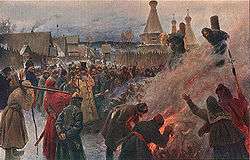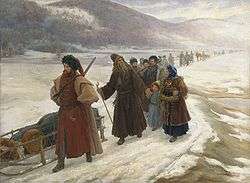Avvakum

Avvakum Petrov (Russian: Авва́кум Петро́в; November 20, 1620/21 – April 14, 1682) was a Russian protopope of the Kazan Cathedral on Red Square who led the opposition to Patriarch Nikon's reforms of the Russian Orthodox Church. His autobiography and letters to the tsar, to Boyarynya Morozova and other Old Believers are considered masterpieces of 17th-century Russian literature.
He was born in Grigorovo, in present-day Nizhny Novgorod. Starting in 1652 Nikon, as Patriarch of the Russian Church, initiated a wide range of reforms in Russian liturgy and theology. These reforms were mostly intended to bring the Russian Church into line with the other Orthodox Churches of Eastern Europe and Middle East.
Avvakum and others strongly rejected these changes. They saw them as a corruption of the Russian Church, which they considered to be the true Church of God. The other Churches were more closely related to Constantinople in their liturgies and Avvakum argued that Constantinople fell to the Turks because of these heretical beliefs and practices.

For his opposition to the reforms, Avvakum was repeatedly imprisoned. For the last fourteen years of his life he was imprisoned in a pit or dugout (a sunken, log-framed hut) at Pustozyorsk above the Arctic Circle before finally being burned at the stake.[1] The spot where he was burned is now marked by an ornate wooden cross.
Despite his end, groups rejecting the changes persisted, and they came to be referred to as Old Believers.
Avvakum's colourful autobiography memorably recounts hardships of his imprisonment and exile to the Russian Far East, the story of his friendship and rupture with the Tsar Alexis, his practice of exorcising demons and devils, and his boundless admiration for nature and other works of God. Numerous manuscript copies of the text circulated for nearly two centuries before its first printed edition in 1861.[2]
References
External links
- Life of Avvakum, academic edition with commentary (in Russian)
- Avvakum's letters to the Tzar and Old Believers (pub. Paris, 1951, in Russian)
- Parallel text version of Life of Avvakum
- English and Russian Articles on Avvakum by P. Hunt